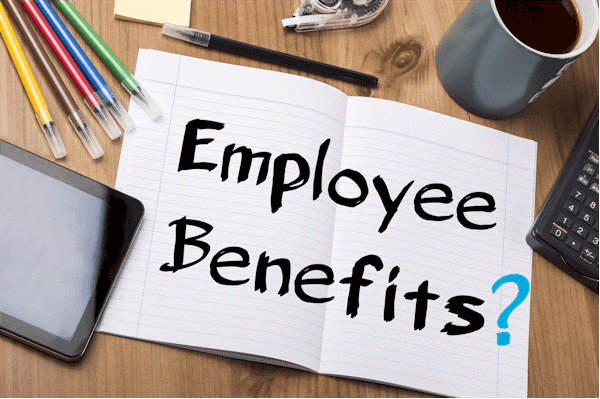 Employee benefits are common in most businesses, but why is that so? I suspect a lot of employees are looking for more than just taxable income. If you have a small business and a tight budget, you might ask yourself if employee benefits are worth the cost and hassle.
Employee benefits are common in most businesses, but why is that so? I suspect a lot of employees are looking for more than just taxable income. If you have a small business and a tight budget, you might ask yourself if employee benefits are worth the cost and hassle.
In a one-word answer to the question – yes, benefits do matter. Benefit programs help businesses attract and keep the best employees, can lead to happier and more productive workers, and in turn that can help your business thrive and excel.
To help explain here are the top six reasons you should offer an employee benefits package.
1. Attracting talented employees
If you want to hire the best employees who are talented, motivated workers ―then a solid employee benefits package is a perfect place to start.
To compete for the best employees, most employers offer employee benefits, a high percent of small businesses offer medical benefits. One study found that 50% of businesses with fewer than 50 employees offer health care benefits. It shows that to be competitive with hiring, you really need employee benefits. If you decide not to offer benefits or feel that you do not need to, you stand the chance of losing the best candidates to businesses that offer a benefits package. A benefits program can be a deciding factor in choosing where to work. It is an important part of their overall compensation.
When a business offers benefits, it shows that you believe in your company, that there are strong enough finances to afford benefits, and that you want to invest in your workforce―which in turn attracts great employees.
While we used insurance as an example, you might want to consider more comprehensive benefits. Because again, better employee benefits can be the deciding factor for an in-demand job seeker. If you want quality workers, you need quality benefits.
2. Keep a healthy workforce
Healthy employees are busier employees. If you want a more productive employee, health benefits are a perfect place to start.
For example, if medical benefits are offered, an employee has the option to seek medical advice sooner than later to prevent major conditions from developing into larger ones. That helps keep the employee healthier and more productive.
Paid sick leave works the same way. By encouraging employees to stay home when they feel ill, you can keep one sick worker from infecting an entire team. Wouldn’t you rather have one employee out than a dozen? Obviously, Covid has had a major impact on this topic. Sick leave lets your workers focus on healing and getting better. The goal is to have them come back refreshed and ready to go―rather than struggling to work through an illness for days.
The main point is healthier employees can lead to a healthier business. It makes good sense to offer health insurance and other wellness benefits.
3. Minimize employee turnaround
While hiring matters, you also need to think about keeping your employees around.
As was mentioned, when talking about hiring, benefits packages can keep your workers from getting swayed by other job offers. And when you offer benefits, you will help your employees feel the company is stable and secure, thus less likely to start putting out resumes.
The expected result is to lower employee turnover and higher employee retention for your business.
For a small group employer, it saves money from hiring and training, because you will not have to do either of those as often. It means you will not have employees go to competitors. It also means you can build a knowledgeable team that can tackle all sorts of problems that would trip up a younger team―all thanks to the employee loyalty you have built with benefits.
If you want to keep employees around for the long haul, you need a benefits package that makes people want to stay.
4. Dollars in pockets
When an employer pays for some or all the medical premiums for their employee, dollar for dollar more money reaches the employee’s pocket. Receiving benefits from an employer, pays for some or all of a necessary service that otherwise would be paid for by the employee after they have paid their taxes.
The employee portion can be deducted from their pay without taxes being withheld. The employer portion of the cost can be written-off as a work-related expense. Combined it lowers payroll taxes for the employer and the employee.
These tax savings are realized through a Section of the IRS (Internal Revenue Services) Code called Section 125 or sometimes known as a Cafeteria Plan.
The result is more benefits with tax savings, more productive dollars in your pocket.
5. Boost employee productivity
A strong benefits package can get you talented workers, keep them around a longer period, and give you a healthier workforce. One of the major results of all those things is more productivity.
Think about it: if you have hired a more talented, motivated workforce that can buckle down and get things done, you will keep employees around long enough to develop good workflow and processes. And you will have helped your people stay healthy, giving them the physical ability to stay productive too.
When an employer offers benefits, the workforce will not feel as worried about affording health care, saving for retirement, taking care of their children, or other concerns that benefits can address. That means they have less worries at home and can concentrate more on business. Not a bad tradeoff.
6. Create a healthy worker morale
Finally, having a good benefits package can and will improve employee morale, leading to better work experience overall.
Providing employee benefits will help your employees feel you care about their personal needs. That, in turn, can improve employee loyalty and satisfaction.
In turn, it can create an excellent work and life cycle for you. Happy, loyal employees will speak highly of your business, making it easier for you to attract talent when you have job openings. After attracting the new employees, they will stick around because of the great benefits, well, this will set a productive pattern. Good benefits, great morale, and greater potential for business.
